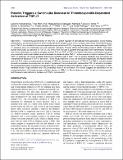Plasmin Triggers a Switch-Like Decrease in Thrombospondin-Dependent Activation of TGF-β1
Author(s)
Venkatraman, Lakshmi; Chia, Ser-Mien; Narmada, Balakrishnan Chakrapani; White, Jacob K.; Bhowmick, Sourav S.; Tucker-Kellogg, Lisa; Yu, Hanry; Dewey, C. Forbes; So, Peter T. C.; ... Show more Show less
DownloadVenkatraman-2012-Plasmin Triggers a S.pdf (479.0Kb)
PUBLISHER_POLICY
Publisher Policy
Article is made available in accordance with the publisher's policy and may be subject to US copyright law. Please refer to the publisher's site for terms of use.
Terms of use
Metadata
Show full item recordAbstract
Transforming growth factor-β1 (TGF-β1) is a potent regulator of extracellular matrix production, wound healing, differentiation, and immune response, and is implicated in the progression of fibrotic diseases and cancer. Extracellular activation of TGF-β1 from its latent form provides spatiotemporal control over TGF-β1 signaling, but the current understanding of TGF-β1 activation does not emphasize cross talk between activators. Plasmin (PLS) and thrombospondin-1 (TSP1) have been studied individually as activators of TGF-β1, and in this work we used a systems-level approach with mathematical modeling and in vitro experiments to study the interplay between PLS and TSP1 in TGF-β1 activation. Simulations and steady-state analysis predicted a switch-like bistable transition between two levels of active TGF-β1, with an inverse correlation between PLS and TSP1. In particular, the model predicted that increasing PLS breaks a TSP1-TGF-β1 positive feedback loop and causes an unexpected net decrease in TGF-β1 activation. To test these predictions in vitro, we treated rat hepatocytes and hepatic stellate cells with PLS, which caused proteolytic cleavage of TSP1 and decreased activation of TGF-β1. The TGF-β1 activation levels showed a cooperative dose response, and a test of hysteresis in the cocultured cells validated that TGF-β1 activation is bistable. We conclude that switch-like behavior arises from natural competition between two distinct modes of TGF-β1 activation: a TSP1-mediated mode of high activation and a PLS-mediated mode of low activation. This switch suggests an explanation for the unexpected effects of the plasminogen activation system on TGF-β1 in fibrotic diseases in vivo, as well as novel prognostic and therapeutic approaches for diseases with TGF-β dysregulation.
Date issued
2012-09Department
Massachusetts Institute of Technology. Department of Biological Engineering; Massachusetts Institute of Technology. Department of Electrical Engineering and Computer Science; Massachusetts Institute of Technology. Department of Mechanical EngineeringJournal
Biophysical Journal
Publisher
Elsevier
Citation
Venkatraman, Lakshmi, Ser-Mien Chia, Balakrishnan Chakrapani Narmada, Jacob K. White, Sourav S. Bhowmick, C. Forbes Dewey, Peter T. So, Lisa Tucker-Kellogg, and Hanry Yu. “Plasmin Triggers a Switch-Like Decrease in Thrombospondin-Dependent Activation of TGF-Β1.” Biophysical Journal 103, no. 5 (September 2012): 1060–1068. © 2012 Biophysical Society
Version: Final published version
ISSN
00063495
1542-0086